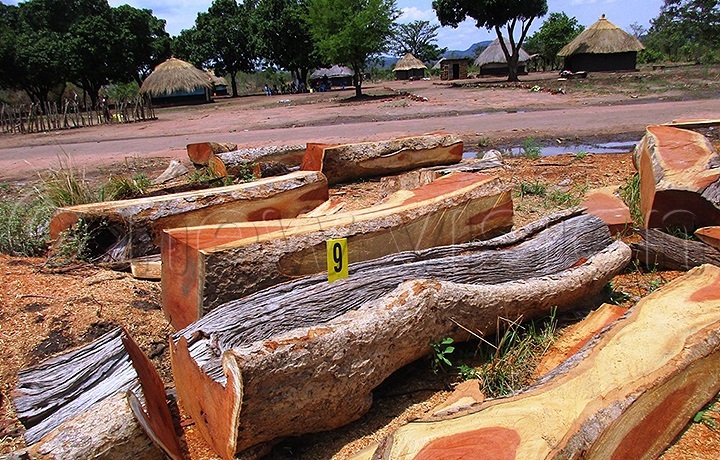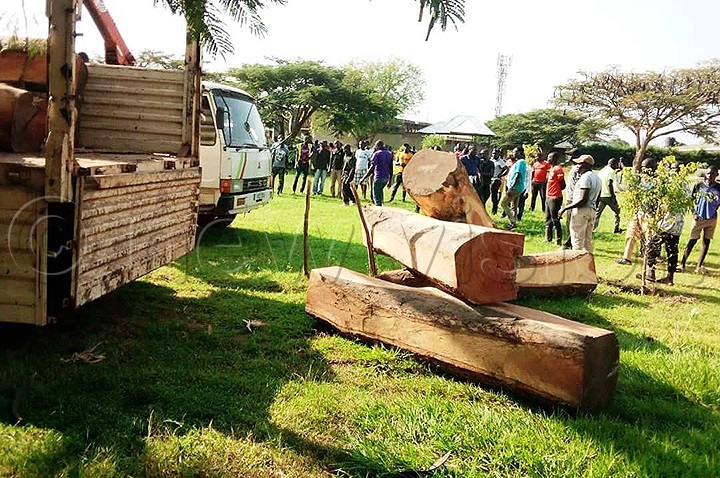Uncoordinated state institutions fueling illegal logging
In Uganda, trading in Shea Nut trees, mangoes and Afizelia Africana, also known as African Mahogany, is illegal.
ENVIRONMENT DEFORESTATION
GULU - The loss of millions of shillings through poaching and smuggling of protected trees has been attributed to lack of coordination among state institutions by an environmental watchdog.
According to Ministry of Water and Environment report 0f 2016 titled "State of Uganda's Forestry", it indicates that forest products exported over five years (2008-2012) were estimated at a value of US$35,643,000 (sh129.8b).
"Logging in Uganda is a well-syndicated business," says Arthur Owor of the ‘Our Trees, We Need Answers' pressure group. "It involves high ranking government officials and the army."
Owor also the founder of the Africa Center for Research said the logging business includes senior military officers, district leaders and those at the central government who conduct the trade through their subordinates.
In Uganda, trading in Shea Nut trees, mangoes and Afizelia Africana, also known as African Mahogany, is illegal.

They are regarded as the most endangered trees, and in December 2017, Sam Cheptoris, the Minister of Water and Environment, banned the harvesting of these species.
Afzelia Africana and Shea Nut trees are only found in West-Nile and Northern sub-regions.
Business still thriving
Despite the ban, trade has continued to flourish, according to the watchdogs. The trees are cut from Lamwo district bordering South Sudan, Adjumani and Arua districts in West Nile, at the border with Democratic Republic of Congo (DRC).
Abel Kagumire, the Uganda Revenue Authority (URA) Commissioner for Customs, said it was hard to establish whether the logs in transit are cut from Uganda or South Sudan since the trees exist in both countries.
Kagumire, however, acknowledged that since the business is illegal, they are taken for documentation across the border and then returned to Uganda for exportation.
"After clearing the logs, that is when you hear that they were cut from Ugandan forests. This is where we want other agencies like the National Forestry Authority (NFA) to verify where they were cut from before clearing," he said in an interview.
William Leslie Amanzuru, the founder of community-based Friends of Zoka in Adjumani district said the Ugandan government needs to be tough on wood poachers and smugglers.
The syndicates are cash-rich and can afford to bribe their way out and to pay the existing fines when they are caught.
The National Forestry Authority (NFA) Act of 2003 stipulates that offenders are liable to a fine of sh800,000, or five years imprisonment or both.
NFA deny harvest of Afzelia
Lamwo district has eight central reserve forests: Lalak, Lukung, Lamwo, River Aringa, River Aswa, Aram, Pa'unyime and Agoro Agu.
Aisha Alibhai, NFA Communications and Public Relations Manager said the trees being cut must be from community land or in no man's land which lies outside their protection mandate.
Alibhai added that the only remaining Afizelia Africana trees at the border are in the protected land of NFA. She also declined to confirm whether there have been cases were loggers stealthily encroach on their forest reserves.
Ministry blames districts
Alfred Okot Okidi, the Permanent Secretary for Minister of Water and Environment said as a Ministry, they have engaged all the eight districts of Acholi sub-region where the problem is rampant to come out with regulations.

Okidi noted that it will help to regulate the movement of such forest products through their districts. However, he wondered why the districts have failed to enforce the ban since the Ministry issued a circular to all local governments.
"It is an illegal trade and why does URA go-ahead to clear the logs. But the fact is that it is also hard to identify if the trees have been cut from Uganda or across," he added.
Uncoordinated actors
Joshua Sendawula the Aswa Regional Environmental Police Officer said they get a lot of intimidations from those engaged in the business in case their logs are impounded.
"It is done by rich and well-connected people. You find us the "small fish" going on to impound a truck, the person will call you saying; "Do you know me? "Do you still want your job"...if you go ahead to enforce, the next day you are transferred," the police officer noted.
In contrast to the NFA's position, Sendawula said most of the logs are cut deep in the central reserve forests. He also acknowledged that the logs are later taken across into South Sudan and DRC for documentation.
"We are having a problem that we cannot coordinate amongst ourselves as government institutions. You find URA has put a seal on a truck and as police, you cannot break it or else you end up in prison," he added.
Ivan Kakaire, the URA Northern regional customs officer said on average in a month, they clear five trucks loaded with Afizelia logs.
The export market includes the United Arab Emirates, Austria, Belgium, Taipei-China, Hong Kong-China, South Africa, Canada, Qatar, Mauritius, Iraq, Ethiopia and among others.
Afzelia which is also known as African mahogany tree has a straight trunk, cylindrical and branchless to up to 20m high. It is mainly used for its heavy wood.
This story was produced by New Vision. It was written as part of Wealth of Nations, a media skills development programme run by the Thomson Reuters Foundation in partnership with The African Centre for Media Excellence. More information at www.wealth-of-nations.org. The content is the sole responsibility of the author and the publisher.